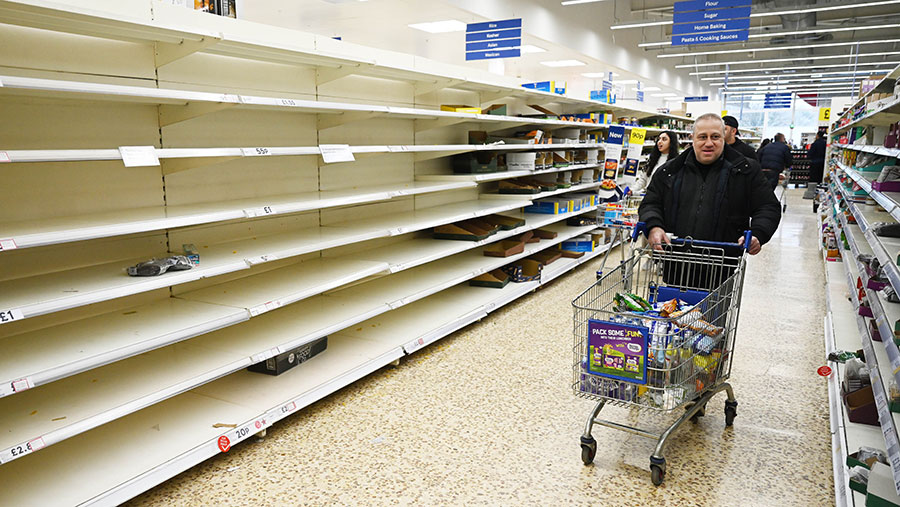FW Opinion: Farmers must pull together in coronavirus crisis
 © NEIL-HALL-EPA-EFE-Shutterstock
© NEIL-HALL-EPA-EFE-Shutterstock Without a doubt, we live in extraordinary times. The speed and severity with which coronavirus has affected so many lives, not to mention stock markets and businesses, has been truly startling.
Agriculture has been far from immune, with some of the leading events in the farming calendar already falling victim to this vindictive virus.
The NFU’s planned Westminster rally was one of the first to go, followed this week by Grassland & Muck, the Pig & Poultry Fair and the Royal Highland Show.
About the author
 Phil Clarke
Phil Clarke
Executive editor, Farmers Weekly
Contact:
E: philip.clarke@reedbusiness.com
T: @FWphilclarke
Read more articles by Philip Clarke
The main farming unions and AHDB have all cancelled farmer meetings, in line with government advice, while the Royal Bath & West, the Devon County and the Royal Cornwall shows, plus Balmoral, Beef Expo 2020 and Open Farm Sunday have all been postponed. Scotland’s Rural College has put an end to face-to-face teaching.
See also: Open Farm Sunday postponed over coronavirus concerns
So far, agricultural commodity markets have been relatively unaffected – apart from some jumpiness in the spot milk market and a surge of activity in the red meat sector.
Grain markets have found some support too, though oilseeds have been undermined by the collapse in world fuel prices.
How long this relative stability lasts is questionable. There may still be market disruption, as consumer demand surges, then subsides.
Coronavirus has also shown human nature at its best, and at its worst. But there are plenty of examples of the farming community pulling together to help ride out the storm.
Imported inputs may become more difficult to source, while sheep exports remain vulnerable to any future border closures.
The threat to labour supply has also been thrown into sharper focus and, while live auction marts remain open for now, that may not last.
Despite all this, it is fair to say that the food supply chain is a better place to be than many other sectors – aviation, hospitality and tourism spring to mind – where business collapses seem inevitable. After all, people still need to eat.
The current crisis does, however, highlight the dangers of being so dependent on food imports, with the UK just 60% self-sufficient.
Policymakers would do well to remember that as they embark on trade negotiations with those who would like an even bigger slice of our market.
Coronavirus has also shown human nature at its best, and at its worst. When loo rolls run out in response to a respiratory disease and paracetamol is trading for over £20 a pack on E-bay, you know the world has gone mad.
But there are also plenty of examples of the farming community pulling together to help ride out the storm.
This is no better exemplified than by the National Federation of Young Farmers Clubs’ initiative, encouraging members to help deliver food parcels to those in self-isolation, to provide relief labour for those with sick workers and, above all, to provide moral support for those who are struggling.
Self-isolation is affecting an increasing number of people – and for some vulnerable people this could be as dangerous as the disease itself.
It is increasingly recognised that agriculture faces a mental health challenge, which is often brought about by financial pressures.
The long-term impact of coronavirus is likely to compound these – whatever money the government throws at the problem.
It is therefore beholden on everyone in the sector to help and support each other – if not by visiting neighbours, then at least by lifting the phone or using social media to keep in touch. And remember, there are charities out there that can help too.
In this difficult time, it has never been more important for people to look out for each other. Fortunately, the farming sector has a great track record in this regard.
